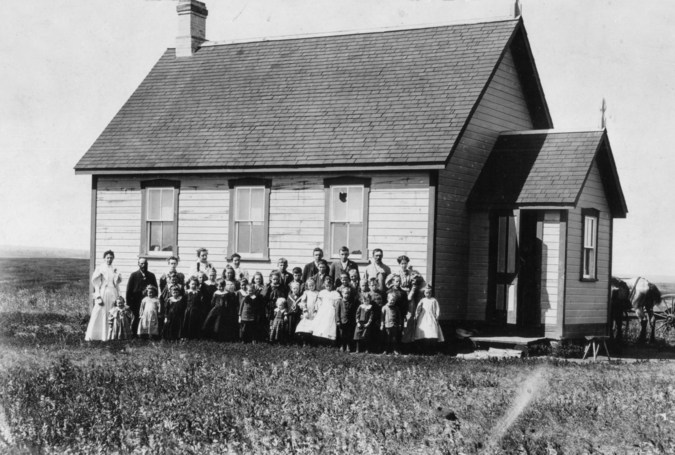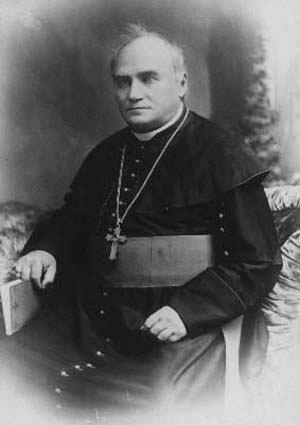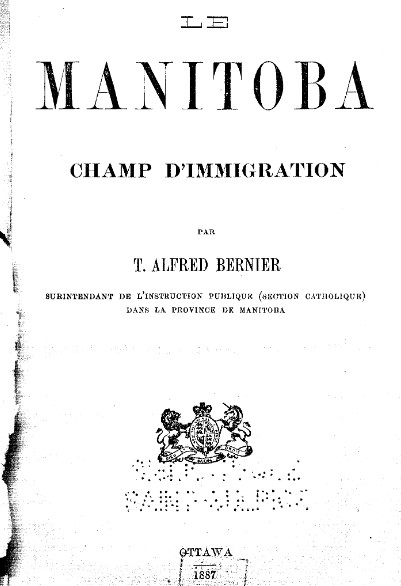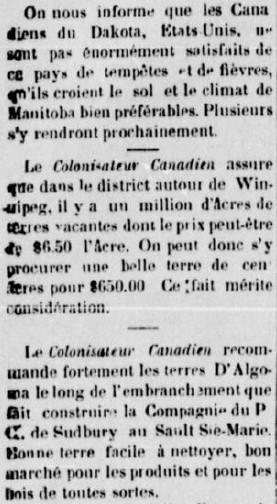As previously noted on this blog, the first efforts to halt French-Canadian emigration to the United States were made not during the deluge of the 1880s, nor even in the immediate aftermath of the U.S. Civil War. As early as the 1840s, statesmen in Lower Canada (by now joined legislatively with Upper Canada) raised a cry of concern about the thousands of farmers’ sons and unemployed forestry workers each year leaving the St. Lawrence River valley. Ambivalent repatriation efforts would follow.
Time and again, for nearly a century afterwards, clergy and government in Lower Canada (later Quebec) prepared reports, proposed legislation, and developed colonization schemes aiming to stop the migration. The ultimate magnitude of emigration to the U.S. Midwest and Northeast says something of the futility—or ineffectiveness, as some argue—of these varied measures.
For their part, contemporary reports reveal a great deal of the intellectual climate of the time. One key aspect was the truly continental scope of leaders’ thinking. In the wake of poverty and limited access to land and financial resources in Quebec, some proposed that French Canadians take advantage of Manitoba’s legal guarantees concerning Catholic education and linguistic duality. By remaining north of the border, these French Canadians would protect their people’s political influence within Confederation—and spare themselves factory work and the influence of “Protestant materialism.”

Even with financial inducements, the distance between New England and Manitoba was prohibitive; to settle there meant abandoning established communities and family networks. It entailed a large risk and little certainty. Even Quebec leaders had their doubts. Editor Jules-Paul Tardivel was especially opposed to western colonization schemes, preferring instead the development of Quebec’s outer regions.
Enter Charles-Agapit Beaudry, a Catholic priest who was won over to the Manitoba cause in 1887. Encouraged by the archbishop of Saint-Boniface, Beaudry worked as a repatriation agent in New England. After travelling across the northeastern states, he submitted the letter below to the federal minister of Agriculture, in which he expressed his high hopes but also some of the resistance he was encountering. Ultimately, as Robert Painchaud explained in 1969,
What is most striking in Father Beaudry’s work is that Manitoba could not expect a mass migration of French Canadians from the United States. At best, one could hope to repatriate some families eager to settle on the land because they could not make their peace with factory life.[1]
Wedged between the North-West Rebellion and the Manitoba Schools Crisis, Beaudry’s efforts marked the last hopeful burst of “Manitoba fever.”

Today the letter remains important as a fragment of the connections between the French-language diaspora in Canada and that in United States. Contemporary observers easily detected parallels between Franco-American communities in the United States and French Canadians living as minorities in provinces other than Quebec. Just as the Franco-American press paid close attention to Louis Riel’s activities on the Prairies, editor J.-L.-K. Laflamme later tied the Corporation Sole controversy to the fight for linguistic and religious rights in Manitoba and Ontario. We can regard this as an invitation to scholars of New England Franco-Americans to adopt, like their subjects of study, a wider continental and comparative perspective.
REPORT ON FRENCH CANADIAN REPATRIATION
Rev. C. A. Beaudry.
La Presentation, 1st September, 1889.
Sir,—I have the honour to submit the report of my trip through the New England States for the purpose of studying the position of our countrymen who have emigrated there, in view of having them repatriated to Manitoba and the North-West Territories.
During the months of May and June last I visited the New England States with the intention of studying the question on the spot, and of making known the advantages of our Canadian North-West for such of our countrymen as might be desirous of returning and taking up farming.
During that visit I met nearly all the French Canadians of the following cities:—Nashua, Manchester, N.H.; Worcester, Mass[.]; Gardner, N.Y. [sic]; Fall River [Mass.], Providence, R.I.; New Bedford, Woonsocket Falls, Boston, Lynn, Lowell, Mass., and other places of less importance.
I found these places filled with French Canadians. The latest arrivals generally came from the poorest parts of the Province of Quebec, especially from the counties below Quebec.
The earlier arrivals and those already settled in the United States for some years, and known as skilful mechanics, receive generally good wages, and moreover many of them are now proprietors, and have no wish whatever to move. However, even among those there are some affected with home-sickness, and anxious to go back, with the intention of taking up farms.

Some others, although not proprietors, but who have saved money, always entertain the notion of having their children settle on good farms. This desire arises from the fact that those children raised amid the pure air of the country, soon emaciate in the impure atmosphere of manufactories. Another cause is, that the most important centres are filled with French Canadians, and as a consequence wages are all the time going down, on account of the great number of hands seeking work. At Woonsocket, for instance, a mechanic hardly gets $1.25 a day, and is frequently without work.
At Lowell, the Rev. Fathers Oblat[e]s being in want of about twenty-five men for the construction of their new church, over 400 mechanics applied for work.
Similar facts have taken place at Nashua and Worcester. If our French Canadians keep on deserting their Province of Quebec this state of affairs will every day grow worse.
The city of Lowell alone has received for its share since last year over one hundred French families, and about the same number went last year to each of the cities of Nashua, Fall River, Manchester and other New England factory towns.
The above information is correct, having been taken from the censuses of the parish priests of those cities.
There is no doubt that among the last arrivals a deduction must be made for families leaving villages who go and remain in large cities with the hope of getting work; but it is a fact well ascertained, in spite of the several political systems, and denials or affirmations of politicians, that emigration keeps on its devastation at the rate of a national plague. This disastrous stream could certainly be stopped and turned in favour of Manitoba.
Many of our people in the States acquire property in lieu of money. On account of their property some of them do not dare to return to their native place, and when they are decided to move they direct their steps towards the (American) west, being under the impression that the Province of Manitoba is a frightful country (a true Siberia), where every one of those who have emigrated has lost his time and fortune.
This consideration explains the fact that 30,000 French Canadians have chosen Dakota preferably to Manitoba.
The most stupid reports and slanders are made against our country for the benefit of Americans.
There is no doubt that the Province of Manitoba, if known in its proper light, would draw a large share of immigrants desirous of returning to their old way of living. By making this country known, hundreds of families would go there and try a future existence, and would be a source of wealth to that country whilst at the same time developing its resources.
To carry this out it is not necessary to spend large sums of money. If the Government would only be willing to appropriate a few hundred dollars to make the resources and advantages of our country known to our countrymen, and offer to them a few of the inducements made to European immigrants, a great benefit would be the result of such an action.
No. 8 of Le Colonisateur Canadien proves that the repatriated French Canadians are good colonists, and that they have as well succeeded, not to say more so, than any of the most fortunate foreign immigrants, and the money spent in favour of repatriation has been well invested.

As a practical conclusion, I humbly pray you to make our country known to our emigrated countrymen, and for that end I will gratuitously and pro patria take charge of judiciously distributing among our countrymen of the States all documents or pamphlets published by your Department, provided that postage stamps will be supplied to me. Moreover, if it is the wish of the Government, I will prepare gratuitously a summary of all questions, answers and objections, en vogue, against Manitoba, and that work would be specially for the use of the French Canadians of the United States. By having printed ten thousand copies of a pamphlet of thirty pages, which would cost very little to the country, a great practical result, I am sure, would be obtained for the future of that Province of Manitoba.
I have the honour to be, Sir,
Your obedient servant,
C. A. Beaudry.
[To the Honourable Minister of Agriculture, Ottawa]
Bibliographical Note
The text originally appeared in the appendices to the “Report of the Minister of Agriculture for the Dominion of Canada for the Calendar Year 1889,” in Sessional Papers, vol. 5, Fourth Session of the Sixth Parliament of the Dominion of Canada (Ottawa: Brown Chamberlin, 1890), 165-166. Library of Parliament.
Short biographies of Beaudry are available from Saint-Boniface’s Centre du patrimoine and the Centre d’histoire de Saint-Hyacinthe. Valuable information on his work and his times appears in Robert Painchaud, “Le Manitoba et l’Immigration Canadienne Française, 1870-91” (University of Ottawa, M.A. thesis, 1969) and again in his expanded study, “The Catholic Church and the Movement of Francophones to the Canadian Prairies 1870-1915” (University of Ottawa, Ph.D. dissertation, 1976).
Of Beaudry’s fellow repatriation agent, Charles Lalime, Painchaud (1976) wrote:
Lalime gradually lost interest in the cause of repatriation in the 1880s. An amelioration in the New England economy, and more importantly the growing belief that the Canadiens could remain loyal to their roots while becoming American citizens—a viewpoint expressed in the early 1880s by [editor Ferdinand] Gagnon himself—, and Lalime’s business interests, all combined to diminish the fervour of previous years. Lalime ceased to be a colonization agent, becoming instead an information officer for the Canadian government and a mere ticket agent.
As noted above, Lalime was not alone. Raymond Huel’s biography of Archbishop A.-A. Taché highlights the rapid disillusionment of both Beaudry and Taché with the thankless and unfruitful work of repatriating French Canadians of the U.S. Northeast.
For French readers, this article from the Revue d’histoire de l’Amérique française offers further context on the vigorous struggle to divert French-Canadian migrants to the West.
[1] “Ce qui ressort nettement de l’oeuvre de l’abbé Beaudry, c’est que le Manitoba ne pourrait compter sur une immigration massive de Canadiens des Etats-Unis. Tout au plus pouvait-on espérer rapatrier certaines familles désireuses de s’établir sur des terres parce que le travail dans les manufactures ne leur souriait pas.”
Pingback: This week’s crème de la crème — October 12, 2019 | Genealogy à la carte
Have you come across repatriation efforts by a priest by the name of CHICOINE, in the Massachusetts and/or other NEngland areas?
Wondering if we share a blodline….
Thanks for your informative posts,
Eloise (Chicoine) Briere
ebriere@albany.edu
Dear Eloise, if I may,
Thrilled to hear from you. I took a look at the Dictionnaire biographique du clergé canadien-français (Vol. 2) and found an abbé Joseph E. Chicoine who was ordained in Montreal in 1887. The Dictionnaire states that he served parishes in Worcester, Holyoke, Spencer, Pittsfield, and Southbridge, starting in 1894; there is no indication that he was involved in repatriation, though he may well have been. Does that fit with your timeline? The Dictionnaire mentions his parents, carpenter Pierre Chicoine and Marie Gauvreau, with Joseph being born in Verchères in 1863. Let me know – I can keep digging.
All best.
Pingback: Emigration and the (Un)Making of a Nation – Active History